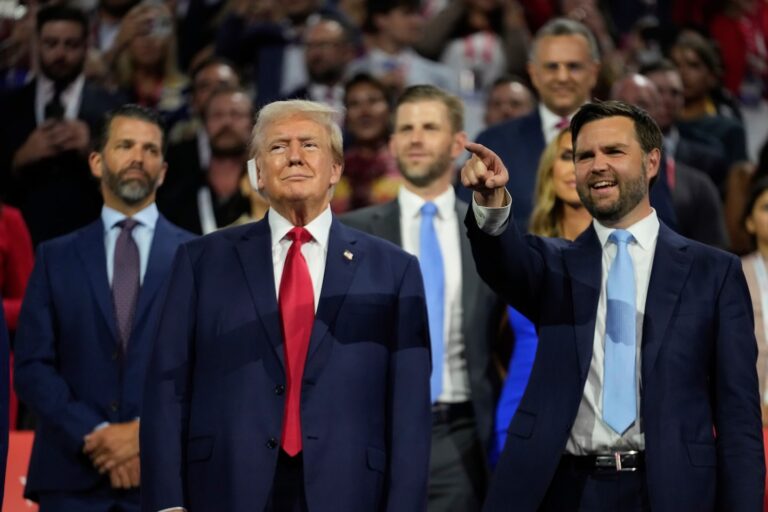It was a good deal for corporate conservatives. Many were socially moderate or liberal, but they got what they wanted on the economy and didn’t have to worry as much about the traditionalists’ agenda. After all, social conservatives had to wait almost 40 years after Reagan’s reelection before enough Supreme Court appointees were ready to overturn Roe vs. WadeDuring much of this period, especially on LGBTQ+ issues, popular norms became more liberal.
Donald Trump’s convention this week, and his choice of Sen. J.D. Vance (R-Ohio) as his running mate, showed the business world being asked to accept a new offer that, at least in principle, is far less in its interests.
Trump has continued to promise big tax cuts and deregulation. He even told a group of oil executives earlier this year that he would roll back President Biden’s clean energy policies and other environmental regulations if they raised $1 billion for him.
But Trump is asking businesses to be more tolerant than Reagan’s sometimes vague social conservatism. Businesses who generally embrace free trade have had to accept much higher tariffs under Trump as well as tighter immigration restrictions that they rightly believe will slow growth.
The convention itself will make business suffer even more. Who would have thought that Republican delegates would be cheering along with Teamsters leader Sean O’Brien as he called the Business Roundtable and the Chamber of Commerce “unions for Big Business” and shouted passionately on behalf of “workers who are sold out to big banks, big tech, corporations and the elites”? Ignore the Republican slogans posted around the hall and the obligatory mention of Trump, and you might have thought O’Brien was speaking at a Bernie Sanders rally.
Vance, meanwhile, has made a name for himself by frequently challenging Republican free-market orthodoxy, criticizing “America’s postwar global order” that “involves increasing reliance on cheaper labor” and advocating for a higher minimum wage.
He has predicted a “much more aggressive approach to protecting domestic manufacturers” in Trump’s second term and has railed against those who would privatize Social Security. He told New York Times columnist Ross Douthat: “I don’t know why people think that you solve a lot of problems by taking a bunch of old people and saying, ‘You’re on your own.’”
Most surprising was his praise for the aggressive antitrust work of Federal Trade Commission Chairwoman Lina Khan, who has been targeted by many in his party (and in the business world).
But business leaders — and many others — have reason to be concerned about the authoritarian side of Vance’s populism. For example, he has said that, unlike then-Vice President Mike Pence, he would refuse to certify Biden’s election in 2020. He has joined his party’s new nationalists in praising Hungarian strongman Viktor Orban and has been skeptical of aid to Ukraine. He has also advised Trump to “fire every mid-level bureaucrat” and “replace them with our people.”
Almost immediately after Saturday’s shooting, Vance declared that Biden’s campaign rhetoric “led directly to an assassination attempt on President Trump.” The effort to delegitimize criticism of Trump clashes with the former president’s call for “unity,” unless unity is defined as universal support for the Republican nominee.
Trump is clearly willing to risk corporate alienation if Vance can send the right message to the blue-collar voters who have been key to the former president’s rise. But the question remains: Is the GOP’s move away from market orthodoxy real, or is it primarily an electoral ploy?
It’s true that Vance is not alone in his dissident economic views. Sens. Marco Rubio (R-Fla.) and Josh Hawley (R-Mo.) have both grown increasingly critical of corporations and rising inequality. New conservative think tanks like the American Compass and a new generation of intellectuals like Sohrab Ahmari have proposed far more interventionist policies.
But most Republicans in Congress remain staunch supporters of free-market ideals and rely heavily on corporate financial support for their campaigns. They are far more enthusiastic about criticizing regulators than they are about the regulated. Witness their attacks on Khan and their move to overturn a pro-union ruling by the National Labor Relations Board under Biden.
History favors market thinkers who win. Trump’s first-term policies were deeply anti-labor. The major legislative achievement of Trump’s presidency was a traditional GOP tax cut that largely benefited corporations and the wealthy, not the infrastructure bill he kept promising but couldn’t get to.
The ideal outcome for Trump would be for blue-collar voters to take his and Vance’s populist rhetoric seriously while business groups tune it out. But unlike the bargain Reagan struck with rival factions of conservatism four decades ago, Trump’s offer promises serious material damage to those who misunderstand his intentions.


